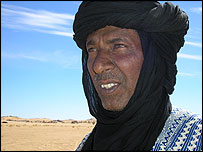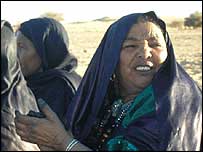|
By Vincent Dowd
BBC, Essouk, northern Mali
|

There surely can be no more spectacular festival site anywhere.
Once Essouk was a major Saharan trading post; today it is little more than a map reference in northern Mali.

The Touaregs' indigo turbans led to their nickname: 'Blue men of the desert'
|
What it still offers however is a wonderfully sited natural amphitheatre in the dunes, some 150 metres wide - the site of a multi-faceted celebration of Tuareg culture.
Around the rim of the arena sit dozens of big leather tents, each the colour of red ochre, sheltering Tuareg who have come from as far away as Niger and Libya, drinking strong, sweet tea boiled on hot stones.
Nothing began even vaguely to schedule and one or two of the events simply did not happen at all.
For myself I was disappointed that the twilight dance of Tuareg shepherds was mysteriously dropped.
But the hundreds of Tuareg who made the long journey to Essouk undoubtedly loved almost every moment.
One gorgeously dressed woman who had travelled from near the Libyan border said she wanted to see Tuareg culture and show it to the world.
Chaotic camel heats
Among the musicians were Tinariwen, the guitar band - internationally the best known Tuareg performers.
"Tinariwen is a group which is really more of a social movement, born out of the struggle for Tuareg recognition in the 1980s," said their British manager, Andy Morgan.
"Since the first festival in the desert in 2001, it has slowly become internationalised, which is having quite a benefit, hopefully, on this region."
Tinariwen come from nearby Kidal but there were other memorable performances too - from vocal group, Iswat, for instance.
The Tende drummers, all female, beat out their appreciation each afternoon while around them some slightly chaotic heats took place in the camel parade.
Only resource
The Essouk festival, which has evolved from an annual "Takoubelt", or Tuareg gathering, is just beginning to be marketed.
Even by Malian standards this is a desperately poor area.
With almost no natural resources, its culture and especially its music are among the few things it can export.
Tuareg leader Issa Dikko hopes the festival can open up the region to the outside world, after suffering drought and conflict in recent times.
"The second reason is to create a forum for all the Tuareg groups from all over the desert."
However, the number of tourists present probably never topped 100.

Hundreds of Touaregs gathered for the festival
|
Kai from Germany said he had gone for "cultural adventure" - he was not disappointed.
The organisers hope they have started a process of building the festival's reputation with world music fans and other tourists to rival that of the better known Festival in the Desert near Timbuktu.
Some think that the Tuareg's nomadic culture is no longer feasible in the 21st Century.
To survive, all cultures need to renew and to celebrate themselves.
